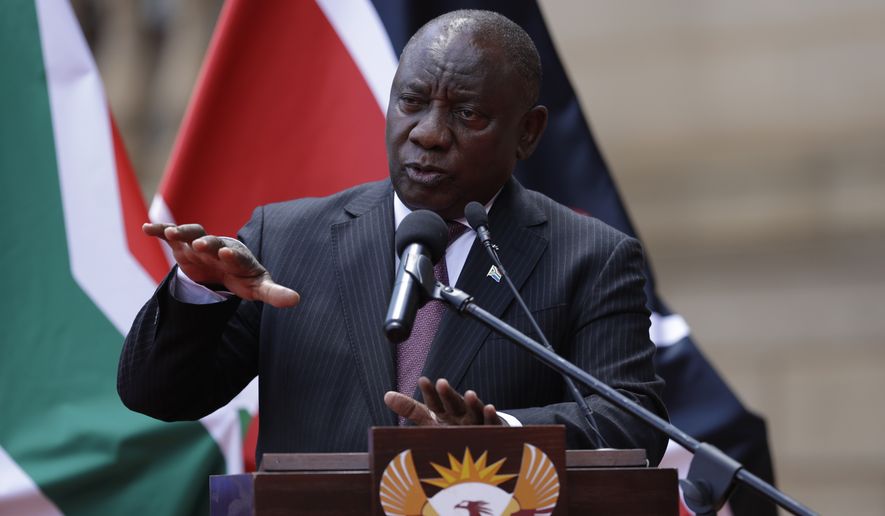DIAMNIADIO, Senegal (AP) – Travel restrictions imposed on South Africa and other African nations for telling the world about the omicron variant are hypocritical, harsh and not supported by science, South Africa’s president said Monday, recalling the phrase used by the U.N. chief, who called such measures “travel apartheid.”
Speaking at the Dakar International Forum for Peace and Security, President Cyril Ramaphosa said the restrictions are punishing the very people and governments that helped inform the world of a new coronavirus variant.
“When South African scientists discovered omicron … they immediately took on the responsibility of informing the world, the entire world, that a new variant is coming through. And what is the result?” he asked, replying that it was punishment.
Ramaphosa said such countries have resorted not to science but their own self-interests. “We say those bans must be removed with immediate effect,” he declared.
Ramaphosa said the travel restrictions affect struggling economies in the region that rely on tourism. The pandemic, access to vaccines and inequalities for the African continent were major points for the leader in addressing peace and security for the continent.
He spoke beside Senegalese President Macky Sall, Niger President Mohamed Bazoum and African Union Chairperson Moussa Faki Mahamat, among other world leaders, who addressed issues of insecurity, the pandemic and what is needed to move the continent forward.
“Beyond COVID-19, we are looking at how the continent of Africa can bolster its own health processes and systems so that we can withstand future pandemics,” he said, adding that trade and investments between African countries must be deepened.
“The most critical aspect at this time, however, is the ongoing negotiation at the World Trade Organization for a temporary waiver of the trade-related aspects of intellectual property rights agreement for the manufacture of COVID-19 vaccines,” he said.
Ramaphosa said, with the WTO negotiations, “this is where we really see that the interests of the more developed economies, the rich countries … their refusal to accede to this proposal,” adding that “they are only interested in advancing the interests of their citizens, not the citizens of the whole world.”
South Africa and Senegal, which hosts the annual conference, are in line to begin producing COVID-19 vaccines next year.
“The task facing us as African nations is to drive the recovery, but the recovery that is sustainable, that is inclusive,” he said
Sall, meanwhile, emphasized the importance of international solidarity in this time of uncertainty.
“The emergence of a new variant in several countries is a reminder that we are all exposed … and in a state that commits us to be resilient, determined and combative as necessary in the face of the harmful effects of a double health and economic crisis,” he said, noting that Africa is also “particularly vulnerable to climate change, the intensification of terrorist attacks and the resurgence of coups d’état. The emergency is here.”
Sall said no individual government or nation or continent can ensure collective security, only international solidarity.
“Environmental and health sectors, organized crime, piracy, cybercrime, migration, and all other cross-border challenges, no country will be able to face solely,” Sall said. “This means that peace and security in Africa are an integral part of peace and security in the world.”




Please read our comment policy before commenting.